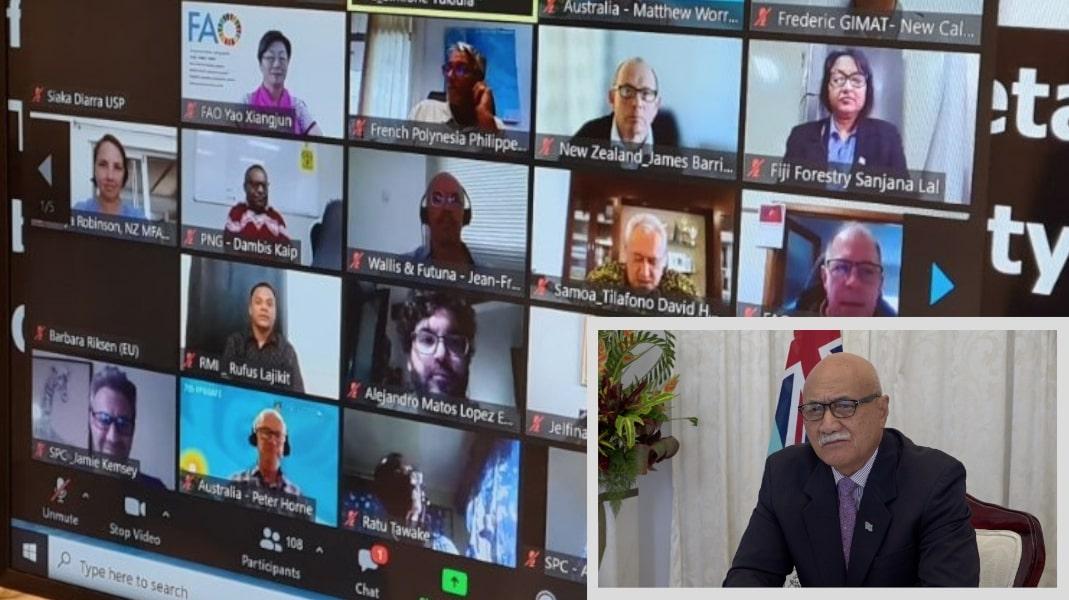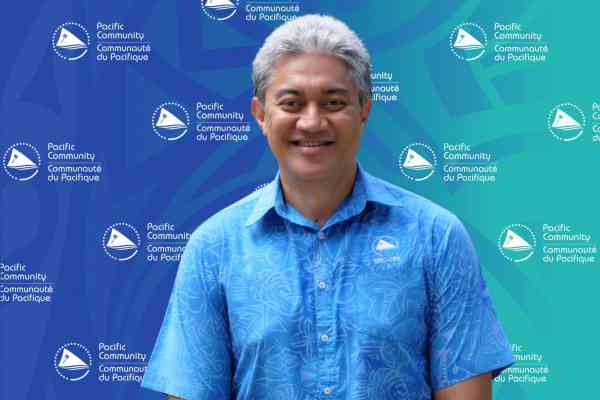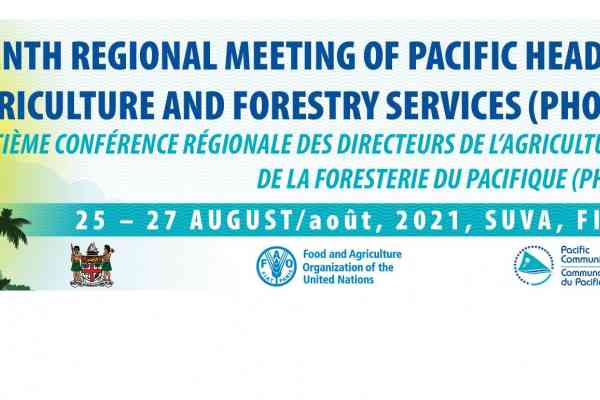· The Pacific Heads of Agriculture and Forestry;
· The Food and Agriculture Organisation of the United Nations and other development partners
· The Pacific Community (SPC), Pacific Islands Forum Secretariat;
· Senior Government Officials;
· Members of the Diplomatic Corps;
· Distinguished Guests;
· Ladies and Gentlemen.
Good Morning, Bula Vinaka, Noa’ia ‘e mauri, Malo e lelei, Talofa Lava, Kia Orana, Halo olgeta, and warm greetings to you all from Fiji.
I am deeply honoured to join you this morning at this 7th Session of the Pacific Regional Heads of Agriculture and Forestry meeting - thank you for the invitation.
Distinguished Delegates, the focus of your meeting is to discuss, share, construct and endorse the proposed architecture for recommendation and for formal adoption whereby there will be more ownership by the Heads of the respective Agriculture and Forestry Services. The endorsement of this may very well have us on the cusp of strengthening coordination of agricultural and forestry in the Pacific.
As custodians of planet earth, it is our duty to be conscientious of the needs of our environment. Therefore, conversations about what we grow and eat and the how or the methodology that we use, are among the most fundamental to human wellbeing. These questions have been asked among communities for eons, since the first taro took root in our islands. Now, I believe it is crucial to ask them again in earnest, as the agriculture and forestry sectors are thrust to the forefront of our response to COVID-19. The global has become local, here in the Pacific and around the world, as community farms have helped put food on families’ tables, even as international supply chains have been rocked by the pandemic. Now, leaders have the opportunity to align our policies and development strategies to build more nutritionally-secure societies that also can rehabilitate our degraded landscapes, to facilitate groundwater retention where needed and manage frequently flooded areas, and to breathe biodiversity back into our countryside. All these can be possible if we seize this chance together.
As respective Heads of the Agriculture and Forestry Services for your nations, there is a great responsibility at hand that dictates collaborative action focussed on comprehensive pathways that shall save Pacific Island Countries and Territories’ (PICT), human, plant and animal health without compromising our unique contributions to global social and economic development. Most of our island nations are quite small and so all the more fragile and vulnerable to all the climate change associated catastrophes.
Distinguished Delegates, only a year ago we were adamant that we would strengthen and improve regional collaboration to amplify and highlight the importance of the Pacific’s rich and unique biodiversity. At this meeting, the foundation for that deep level of cooperation needs to emerge. Now is the opportunity to put forward tangible regional policies that engage in exchanges that consider resilient and nutritious food availability. We now have the opportunity to build a Pacific community that can respond to the climate reality by sustainably managing our natural resources, ecosystems and markets.
As a result of pressing environmental concerns and the degradation of our ecosystems, we cannot afford to be mediocre or complacent when it comes to matters of agriculture and forestry, or other resource-based sectors and the environment as a whole.
UNDERNOURISHED WORLD POPULATION
Distinguished Delegates, the United Nations estimates that nearly 690 million people in the world are undernourished, an increase of 10 million in one year. At this rate, eradicating hunger by 2030 is going to be one of our greatest challenges. In fact, if we fail to address this trend, we could have more than 800 million hungry people in the world by the 2030 Sustainable Development Goals deadline. It would be a great injustice against the most vulnerable should we allow this to happen.
There are numerous reasons for these. Climate change and the global COVID-19 pandemic are parallel crises that have amplified inequality and poverty; and therefore, aggravate the pre-existing socio-economic challenges across the world — with Small Island Developing States having borne our share of that growing burden.
BUILDING CLIMATE CHANGE RESILIENCE
Distinguished Delegates, the Intergovernmental Panel on Climate Change (IPCC) earlier this month released its 6th Assessment Report. The report recorded an entire decade, from 2011 to 2020 to be the hottest ever recorded in 125,000 years. The report among many other findings identifies the unequivocal factor that has increased the warming of the global atmosphere and ecosystem that was set on by human influence.
We now face a natural phenomenon in climate change, which continues to wreak havoc. Unfortunately, these disastrous consequences will only intensify in the coming decades. More frequent and stronger storms are destroying vast regions of farmland. Rapid rising sea levels are devastating for the coastal habitats as it displaces families and causing destructive erosion of the shorelines.
Erratic weather patterns threaten traditional farming and if drastic and immediate cuts to carbon emissions are not secured, the impacts shall become much more serious. So, we must discuss how this sector can strategize to carefully manage our forests to safeguard and recover our natural carbon stocks. We have already lost so much of our native forests and tree cover across our countries, and that trend cannot continue! Natural history has shown us that forests can even recover all by themselves, if they are allowed to. But, why not give them a helping hand by consciously restoring and protecting our landscapes?
Forests and trees also provide us with many other ecosystems services. For example, forests are known to be rainmakers, especially those that are at higher altitudes where the Cloud Forests are! These are very unique forests that have lots of orchids, ferns and mosses living on the tree trunks and branches; and they are vital for harnessing water from the clouds and trickling it down slowly, to us on the ground. So, Cloud Forests, and in fact, all forests and trees, play a vital role in our water cycle, locally and globally!
All plants also need that water to grow. To start life with it, and use sunlight energy to capture atmospheric carbon dioxide, store that carbon within themselves and grow bigger while giving us back oxygen! Now, we NEED this oxygen! We will die if we do not have oxygen to breathe! So, obviously, bigger plants like trees, and collectively, forests, are like our oxygen factories and so are also known as Lungs of our Planet Earth. We NEED forests as much as we need to breathe clean fresh oxygenated air, and we NEED forests as much as we enjoy clean fresh water to drink!
We must also build climate smart agricultural systems to boost nature-positive food production across the land and sea scapes to stabilise our island environments, or we will cease to exist.
The United Nations Food Systems Summit aimed at transforming food systems to achieve the Sustainable Development Goals by 2030, states that nature-positive food production systems protect nature. This relies on sustainable and regenerative practices that enhance the richness and abundance of biodiversity in land and water, and rehabilitate the functions of degraded natural systems to deliver a climate-positive future in which people and nature can thrive. The aspirational outcomes to be achieved include protection of our natural ecosystems against new conversions for food and feed production, to manage existing food production systems to benefit both people and nature, as well as to restore and rehabilitate degraded ecosystems and soil function for sustainable food production.
The worsening climate threat is not secondary to COVID-19. Months away from the cyclone season in our region, it must be addressed collaboratively with equal urgency as the global pandemic. Should we intend to serve our people well, our response to climate change and the pandemic must be guided by our long-term commitment to carbon-neutral, climate-resilient societies that also protects and restores nature.
COVID-19
Distinguished Delegates, the impacts of the COVID-19 crisis reach far beyond the arena of health. The pandemic has dramatically impacted our food systems and threatens our food security should it not be addressed.
Here in Fiji the COVID-19 pandemic has influenced a growth in subsistence farming and backyard gardening. In my role as Fiji’s President/Head of State, I wear several hats and one of which is Champion and Lead Advocate in backyard gardening, an initiative of Fiji’s Ministry of Agriculture. As an avid farmer, I am passionate about my State House backyard farm. Before the global effects of COVID-19 my team and I would travel to communities and advocate for subsistence farming to address the issue of food security. With COVID-19 this issue affects food security in each country differently, therefore solutions need to be specific and relevant instead of a blanket-approach solution.
NON COMMUNICABLE DISEASES
Distinguished Delegates, COVID-19 is an economic shock that has struck the bottom line of businesses, crippled entire industries and left hardworking people without reliable streams of income, forcing families to make trade-offs in both the quantity and quality of their food. For some families, this has led to insufficient calories as well as insufficient variety and quality from unhealthy dietary options.
When putting on one of my other hats as Champion/Lead Advocate in the Fight Against Non-Communicable Diseases, what deeply troubles me is the reality of what an increase in unhealthy and decrease in nutritional diets can lead to in the Pacific –– a deadly overreliance on convenient and affordable processed foods. This increases the burden of Non-Communicable Diseases, which already has a disproportionate and devastating effect on Pacific Island peoples.
Ladies and gentlemen, it has become a sad reality that in the midst of an ocean teeming with fresh and nutritious food and on islands with rich soil and a favourable climate, Pacific island states have some of the highest rates of diabetes in the world. Reversing this trend even at my age is a personal mission in my own life that I am proud to share with this Forum. With COVID-19 now putting food systems under strain as global food supply chains are disrupted, the synergies between agriculture, food security, forestry, fisheries, biodiversity and human wellbeing, and prosperity are laid bare.
GENERATIONAL RESPONSIBILITY
We have an added responsibility to ensure intra-generational and inter-generational equity that dictates that as we strive to meet the needs of the present generation, we do not compromise the ability of future generations to also meet their needs.
So, we need to grow our way towards a sustainable, healthy food system that can guarantee that our people have enough high-quality food to ensure a healthy and fulfilling life. Better food, better choices, and a better future.
Food is more than something we eat or drink to sustain ourselves. That definition may suffice for a textbook, but it is a pale description of its role in our lives. Food is a source of culture, of tradition, and of community. It is a source of livelihoods; a source of meaning, and a bridge of connection to the natural world around us. It has the power to bring comfort, to build friendships, and to bring people together. It has the power to mend the fraying ties between humanity and the ecosystems we have relied upon for all of our existence. By re-making our relationship with food, with food-based livelihoods, and with our forests, we re-make our relationship with the planet. Not only for our benefit, but for the benefit of coming generations.
Distinguished Delegates, I cannot stress enough the great responsibility you each possess and the importance of this meeting. This is an opportune time to develop and refine national and regional Agricultural and Forestry Plans. The discussions and collaborative spirit can influence the architecture, research and policy priorities for Pacific agriculture and forestry for the coming years. At this meeting you will map out strategy for the provision of scientific advice, capacity building and services on conservation, forest landscape management, exploring resilient agricultural systems, diversification of livelihood strategies and access to markets to maintain ecosystem services, improve land productivity, food and nutrition security. The work you do here matters!
We must ensure that the summit hears a strong and unrelenting Pacific voice. One with purpose and unity, backed by strong science that embodies the Pacific experience.
Ladies and gentlemen, as Pacific peoples our relationship with our ecosystem and our families are of great importance. So, before I conclude, I wish to convey my sincere gratitude to the Secretariat of the Pacific Community (SPC) and United Nations Food and Agriculture Organisation for creating a platform and in bringing us together as Pacific Island neighbours to consult and discuss the best way forward in strengthening our relationship and the region’s agriculture and forestry sectors. I also wish to acknowledge the hard work and efforts by the SPC Land Resource Division that has kept our region apace with an ever-changing global environment.
I thank you all for listening, and once again, I am grateful for the opportunity to have addressed you today. Distinguished Delegates, with those few words, I wish you all a pleasant and productive meeting.
Thank you, Vinaka vakalevu, faieksia, malo 'aupito, faʻafetai, Tenkyu tru, and May Almighty God bless you all and our beloved Oceania.


